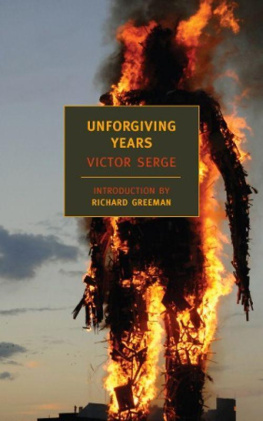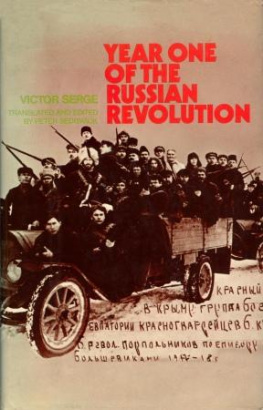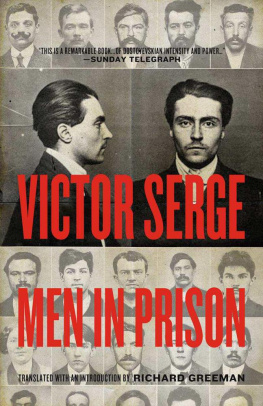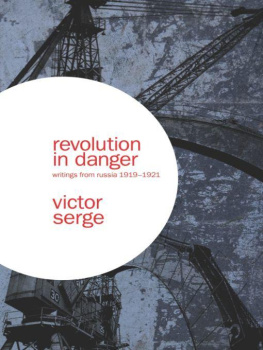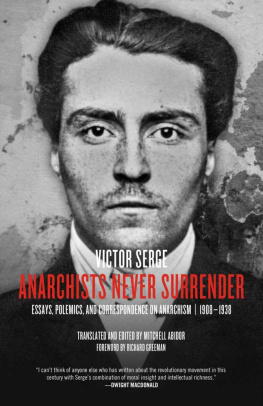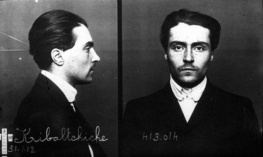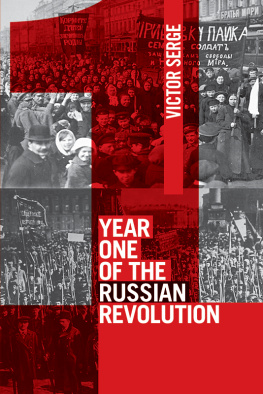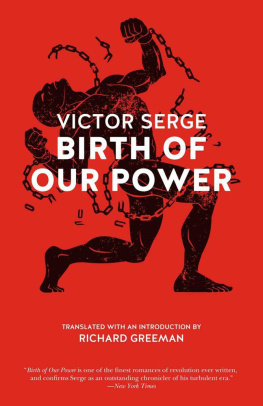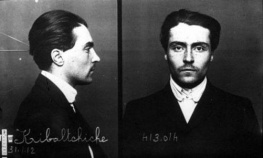VICTOR SERGE (18901947) was born Victor Lvovich Kibalchich to Russian anti-Czarist exiles, impoverished intellectuals living by chance in Brussels. A precocious anarchist firebrand, young Victor was sentenced to five years in a French penitentiary in 1912. Expelled to Spain in 1917, he participated in an anarchosyndicalist uprising before leaving for Russia to join the Revolution. Arriving in 1919, after a year in a French concentration camp, Serge joined the Bolsheviks and worked in the press services of the Communist International in Petrograd, Moscow, Berlin, and Vienna. An outspoken critic of Stalin, Serge was expelled from the Party and jailed in 1928. Released, he managed to publish three novels (Men in Prison, Birth of Our Power, and Conquered City) and a history (Year One of the Russian Revolution) in Paris. Arrested again in Russia and deported to Central Asia in 1933, he was allowed to leave the USSR in 1936 after international protests by militants and prominent writers like Andr Gide and Romain Rolland. Using his insiders knowledge, Serge published a stream of impassioned, documented exposs of Stalins Moscow show trials and machinations in Spain which went largely unheeded. Stateless, penniless, hounded by Stalinist agents, Serge lived in precarious exile in Brussels, Paris, Vichy France, and Mexico City, where he died in 1947. His classic Memoirs of a Revolutionary and his great last novels, Unforgiving Years and The Case of Comrade Tulayev (the latter also published by NYRB Classics), were written for the desk drawer and published posthumously.
RICHARD GREEMAN, the translator of four of Victor Serges novels, has written a doctoral dissertation about Serge along with numerous other studies of his work and life. A collection of Greemans political essays, Dangerous Shortcuts and Vegetarian Sharks, appeared in 2007. More of his work can be found at www.richardgreeman.org.
By the Same Author
NONFICTION
Memoirs of a Revolutionary
The Year One of the Russian Revolution
FICTION
Birth of Our Power
The Case of Comrade Tulayev
Conquered City
The Long Dusk
Men In Prison
Midnight in the Century
UNFORGIVING YEARS
VICTOR SERGE
Translated and with an introduction by
RICHARD GREEMAN
NEW YORK REVIEW BOOKS

New York
Contents
Translator's Introduction
UNFORGIVING Years is at once the most bitter, the most cerebral, and the most poetic of Victor Serges seven novels. It was first published in France in 1971 twenty-five years after the authors death and has never appeared before in English. The setting is World War II, and Serge pushes realism to the modernist limits of hallucination, presenting extravagant, terrifying, poetic visions of men and women prowling the debris of a self-destructing mechanical civilization. In Unforgiving Years Serge captured the surreal twenty-fifth hour atmosphere of World War II in a way that, according to the critic of Le Monde, prefigured and preceded post-war German literature.[] The novel poses without answering the questions of political action, art, and human consciousness; or rather answers them through mysterious metaphors like the central fire, funeral masks [that] lie preserved in the earth, and the impudent, irresistible phallic power of a banana
Unforgiving Years is divided into four sections, four symphonic movements, each of which evokes its distinctive time and place through its tone and atmosphere. The first movement, entitled The Secret Agent, expresses the sinister unreality of a Paris indifferent to the approach of war in a chill minor key. The second, The Flame Beneath the Snow, is discordant, heroic, and secret like one of Shostakovichs wartime symphonies. It portrays a frozen, starving Leningrad during the thousand days of the Nazi siege. The third movement, Brigitte, Lightning, Lilacs, imagines the final days of Berlin under Allied bombardment in mode of Wagnerian Gtterdmmerung, while the final movement, Journeys End, is a tragic requiem set in the stark, volcanic Mexican selva where death and life repeat their endless cycle.
Against this panorama of planetary catastrophe, Serge poses his collective protagonist: a quartet of loyal, idealistic Soviet secret agents, veteran revolutionary fighters from the Russian Civil War period (19181921), now disillusioned. Operating in Europe where Hitler is triumphing and war looming, their faith in the Party is shaken by the Moscow Trials and the Stalinist totalitarian nightmare developing back in Russia. Caught in this labyrinth of madness,[] torn between a heroic sense of duty and the recognition of a historical impasse, doomed to be eliminated by the GPU apparatus if the gestapo doesnt get them first, they search for an escape from a world without possible escape while trying to make sense of history and of their individual lives.
Serges authentic depictions of character and place are based on his own experiences as a European Communist in the Russian Civil War and an agent of the Comintern in Central Europe. The locales of the novel Paris, Leningrad, Berlin, Mexico were the places where he had lived and struggled. Which leads us to the double question: Who was Victor Serge, and why do we still have to have to ask that question in 2007?[]
A WRITERS FATE
During his lifetime, Victor Serge (pseudonym for Victor Lvovich Kibalchich, 18901947) was admired (or persecuted) both as a French novelist and as a Russian revolutionary.[] As distinct from many Western writers and intellectuals for example Koestler, Malraux, Orwell, or Silone who flirted at one time or another with revolution, Serge-Kibalchich was a revolutionary and an internationalist more or less from birth, and remained one to his death. The stateless son of exiled anti-Czarist Russian parents wandering Europe in search of good libraries and cheap lodgings, Serge was born by chance in Brussels, Belgium. Home-schooled by these penniless, idealistic exiled scholars, young Victor imbibed the heady traditions of the Russian revolutionary intelligentsia while growing up poor on the streets of Brussels. So poor that at age eleven he watched horrified as his younger brother died of malnutrition, while he survived on the pilfered sugar soaked in coffee that little Raoul refused to eat. Throughout the rest of my life, he recalled, it has been my fate always to find, in the under-nourished urchins of the squares of Paris, Berlin, and Moscow, the same condemned faces of my tribe.
At age fourteen Victor is a militant Socialist Young Guard; at fifteen a member of a rebel gang of Brussels apprentices writing and printing their own radical anarchist sheet, The Rebel (pseudonym Le Rtif : The Maverick). At eighteen he is starving in Paris, devouring the contents of the Sainte-Genevive library while editing Lanarchie, lecturing on anarcho-individualism, giving Russian lessons, and translating Russian novels to survive. At twenty-one Kibalchich is sentenced to five years in a French penitentiary for refusing to rat on his anarchist brothers from Brussels who, unwilling to be master or slaves, became bandits the first ever to use automobiles to attack banks (the police had bikes). Known as the tragic bandits, most of them die in shoot-outs with the Paris police or on the guillotine. Released from prison in 1917, Victor is expelled from France and comes back to life in Barcelona, where he works as a printer, participates in a revolutionary workers uprising, and publishes his first article signed Victor Serge. The title: The Fall of a Czar.

